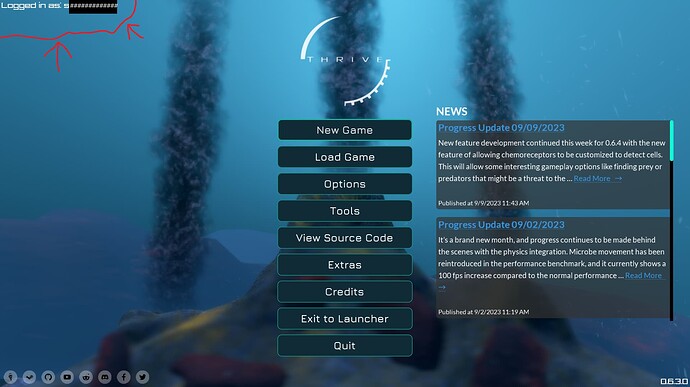Bro got “New User of the month” and decided to leave afterwards
I would absolutely lose my sanity if I had to answer any asked questions. I sometimes leave questions for others to answer, and sadly quite often the case is that no one then ends up answering the question.
The RGS was made for the purpose of developing Thrive. I don’t think that the association will make another game besides this one, but that’s a long way off.
Where is the questionnaire link? Please fix this.
It’s this. It looks like a header so easy to overlook.

I am thinking that if auto evo has not yet developed terrestrial plants, wouldn’t the player species of heterotroph always be trapped in the water?
Well kind of. If I remember right some of the first species experimenting going on land did so perhaps to just hide their eggs from predators that live in water. Or I may misremember that, but that kind of initial being on land could still happen.
As much as I’d like to avoid it, I think for gameplay purposes we will need to put in some kind of system that forces specific kinds of species to appear if an important type of species is missing.
The society stage for that would be very interesting. You are only able to do fishing and farming seaweed, the lands are barren, the only resource is mining.
to mine like that you’d need some very strong claws or teeth
What is the awakening tech list ideas so far?
I always feel that games nowadays are a bit contradictory. In the later stages of cell design, a large number of organelles often start to pile up, but auto evo seems to not encourage large cells.
Is the current auto evo evaluation quantity still based on ATP?
But it has never been that? As can be seen in the game with the auto-evo explanation popup, auto-evo works entirely based on energy gains from different sources and then just divides that by individual cost. That individual cost is based on the cell size (in an exponential way). It is true though that some of the energy sources take the amount of ATP that certain organelles can produce using a specific resource for example into account.
All of out auto-evo code is open source and it is here:
Or maybe it’s more approachable to watch @thim’s video:
I may have mixed energy with ATP.
May passive proteins and possible genetic evolution trees (technology trees or similar mechanisms) enter the game? The upgrade of organelles is good, but I always feel that the game lacks expression of the relationship between proteins and genes.
The newly proposed condition unlocks the feeling of being somewhat Lamarckian.
Also, as a player, I don’t quite accept that I have to intentionally die to unlock Pilus.
Maybe. But probably not. I think we are currently at a pretty good level of complexity. We have some comments hoping for more biochemistry details, but way more negative steam reviews saying you need a degree in biology to play the game (this is obviously hyperbole, but we are making a game that the average gamer should be able to pick up without knowing biology).
Isn’t that just one of the possible conditions? The reasoning with this condition is that you can do either predator things or prey things (being eaten) to have the evolutionary pressure to evolve physical forms of attack.
I reread the code. I thought of the two conditional relationships as’ and 'before.
Introducing biochemical details does not actually prevent players who do not understand biology from getting started, just like when players first start playing paradox games, they may not necessarily have an understanding of history.
I remember when I first started playing Stellaris, I didn’t actually understand what these technologies were, just looking at buffs.
The details of biochemistry bring a sense of science popularization and familiarity, but their operation in the game is brand new knowledge. All players need to understand is the functionality of each module in the game during gameplay.
The main reason is that if a new player is exposed to a large number of mechanisms from the beginning of the game, they will be confused by unfamiliar knowledge and therefore do not know how to start. This unfamiliarity will be diluted by relatively familiar biochemical details, and for players who are not familiar with biology, more importantly, game guidance and functional annotations.
The function of unlocking a system is to allow mechanisms to gradually become complex from simplicity, avoiding being unable to access complex mechanisms from the beginning. Biological evolution is often not the best but sufficient, and this game should allow both ordinary players to have sufficient designs and designers to explore the best designs.
I think Stellaris’ lottery mode technology tree actually meets the requirements of Thrive, which requires a certain amount of randomness but also a certain degree of player control. The possibility of obtaining specific genes can be increased using existing genes.
I am thinking of a comprehensive model that combines gene assembly, passive protease, and gene unlocking. If we want to consider the transfer of player species to AI species after extinction, it means that this model should also be usable by AI.
No, but you can change the display name.
How?
You change the display name in the miscellanious section of the settings.
That’s the Steam username that is displayed. There is no way to change that in the game. It can be only changed through Steam. There’s also no option to remove that as it is basically the indicator that the Steam integration started correctly.

